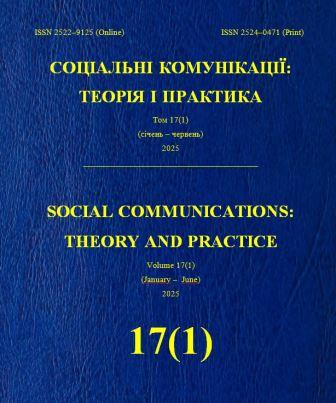Науковий журнал “Соціальні комунікації: теорія і практика / Social Communications: Theory and Practice” – Scientific Journal (https://new.comteka.com.ua/index.php/journal/index).
For volumes 1-17, look at https://new.comteka.com.ua/index.php/journal/index
рISSN 2524-0471 (Print)
eISSN 2522-9125 (Online)
Періодичність – двічі на рік
Видавець – видавничий відділ ГО “Науково-освітній центр “УСПІШНИЙ”
Проблематика: теорія та історія соціальних комунікацій.
Науковий журнал містить результати досліджень фахівців із соціальних комунікацій, представлені авторами різних країн світу.
Дослідження стосуються теорії, методології та історії соціальних комунікацій, теорії та історії журналістики, прикладних соціально-комунікаційних технологій, специфіки соціальних комунікацій у політичній, соціальній і культурній сферах діяльності людини. Матеріали зацікавлять фахівців із соціальних комунікацій, психологів, політологів, філологів, соціологів та філософів.
The scientific journal features research conducted by social communications experts, presented by authors from around the world. The research covers the theory, methodology, and history of social communications, as well as the theory and history of journalism, applied social communication technologies, and the unique aspects of social communications within political, social, and cultural areas of human activity. The materials will interest social communications specialists, psychologists, political scientists, linguists, sociologists, and philosophers.
From December 28, 2020, the Magazine has a DOI prefix: 10.51423
For volumes 1-16, look at https://new.comteka.com.ua/index.php/journal/index
Aims & Scope:
The periodical scientific journal contains the results of research conducted by specialists in social communications. Research concerns the theory and history of social communications, theory and history of journalism, library science, information technologies and records management, records management, archive studies, bibliology, applied social and communication technologies, social communications in sociology and international security, social communications in pedagogy and teaching methods, theory of consciousness, theory of communication and other. Published materials interest researchers in social communications, psychologists, political scientists, philologists, sociologists, and philosophers.
Storage Policy
The editors of Social Communications: Theory and Practice understand that each author wishes to leave a copy of their article in an institutional or another repository of their choice.
The journal Social Communications: Theory and Practice editors allow authors to store all versions without embargo in an institutional or other repository of their choice.
At the same time, the editors ask the authors to take into account the provisions of the repository policy:
1.1. Each author can place their article on any repository.
1.2. Each author has the right to use the content of their article at their discretion, but referring to the journal “Social Communications: Theory and Practice” (it is necessary to indicate the site on which the article was published).
1.3. Before the publication of an article in the journal “Social Communications: Theory and Practice”, the author does not have the right to place the full text of the article in any repository if the essay has been submitted for consideration by the said editorial office. An exception to the placement of materials in international repositories may be only the placement of appendices to the article (tables, graphic interpretations of data, photos, geographical maps, survey forms, protocols of experiments, etc.).
1.4. If the version of the article is accepted by the editors of the journal “Social Communications: Theory and Practice” for publication, the author has the right to place it in an international repository, but at the same time provide a link to the website of the journal “Social Communications: Theory and Practice”.
1.5. The author can place the article’s published version in any repository worldwide.
Політика сховища
Редакція журналу «Соціальні комунікації: теорія і практика» розуміє, що кожен автор хоче залишити копію своєї статті в інституційному чи іншому сховищі на свій вибір.
Редакція журналу «Соціальні комунікації: теорія і практика» дозволяє авторам зберігати всі версії в інституційному чи іншому сховищі за вибором автора без ембарго.
Разом із тим редакція просить авторів врахувати положення політики сховища:
- Кожний автор має право розміщувати свою статтю на будь-якому репозитарії.
- Кожний автор має право користуватися контентом своєї статті на свій розсуд, але посилаючись на журнал «Соціальні комунікації: теорія і практика» (необхідно вказувати сайт, на якому була опублікована стаття).
- Автор до публікації статті в журналі «Соціальні комунікації: теорія і практика» не має право розміщувати повний текст статті в будь-якому репозитарії, якщо стаття подана на розгляд згаданої редакції. Винятком для розміщення матеріалів у міжнародних репозитаріях може бути лише розміщення додатків до статті (таблиці, графічні інтерпретації даних, світлини, географічні карти, бланки опитувань, протоколи експериментів тощо).
- Якщо версія статті прийнята редакцією журналу «Соціальні комунікації: теорія і практика» для публікації, автор має право розмістити її в міжнародному репозитарії, але при цьому подаваючи посилання на сайт журналу «Соціальні комунікації: теорія і практика».
- Автор може розміщувати опубліковану версію статті в будь-якому репозитарії світу.
Періодичний науковий журнал “Соціальні комунікації: терія і практика” містить результати досліджень, проведених фахівцями із соціальних комунікацій. Дослідження стосуються теорії та історії соціальних комунікацій, теорії та історії журналістики, бібліотекознавства, інформаційних технологій та документознавства, документознавства, архівознавства, бібліології, прикладних соціальних та комунікаційних технологій, соціальних комунікацій у соціології та міжнародній безпеці, соціальних комунікацій у педагогіці та методиці навчання, теорії свідомості, теорії спілкування та ін. Опубліковані матеріали будуть цікаві для дослідників соціальних комунікацій, психологів, політологів, філологів, соціологів, філософів.